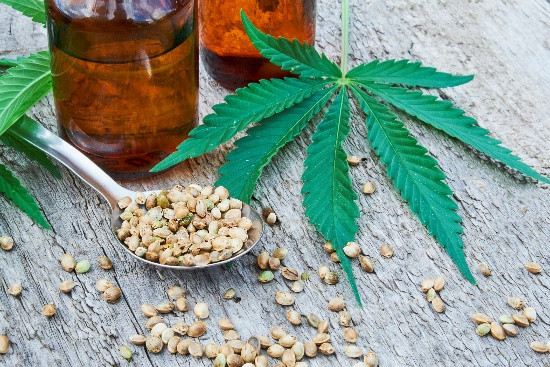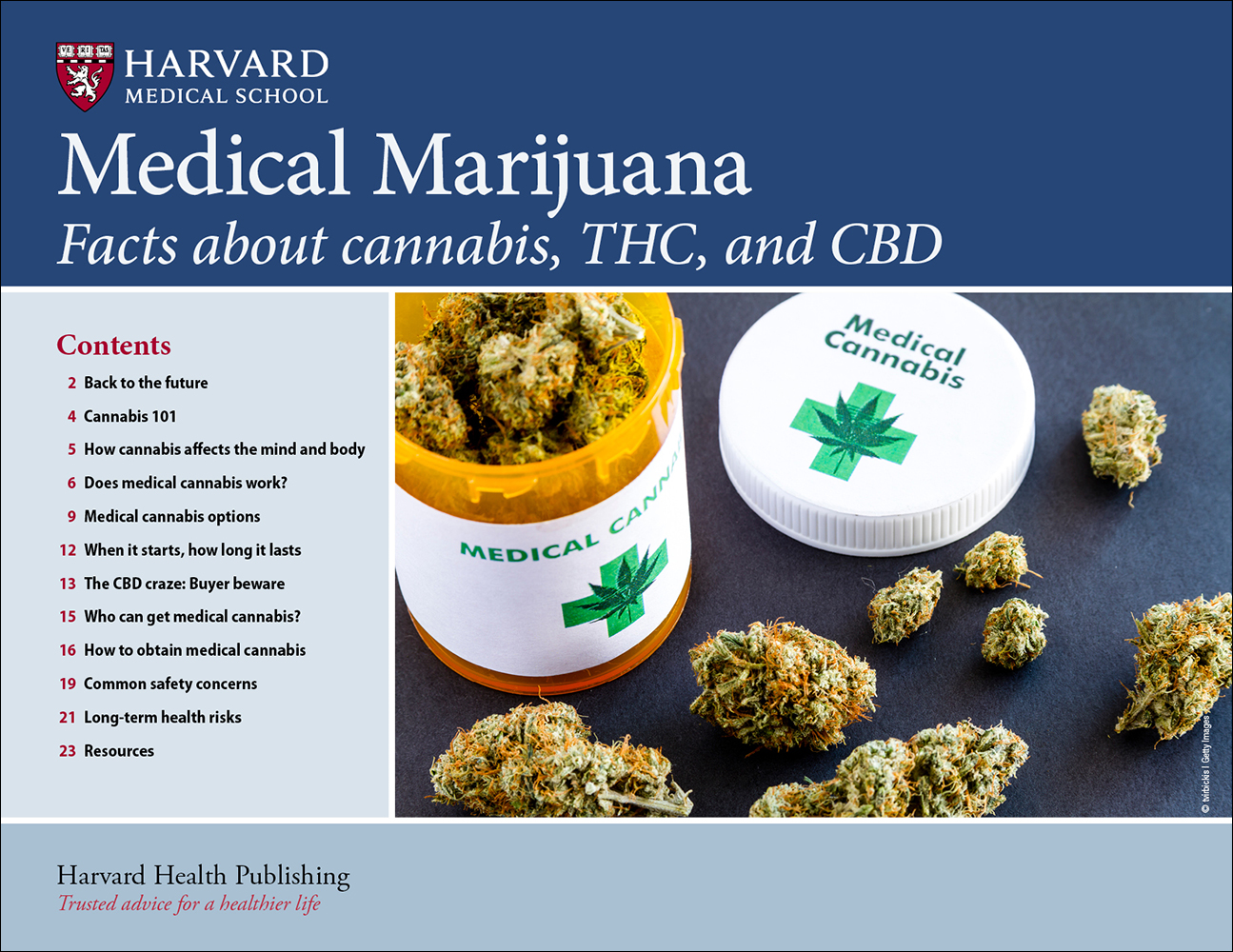Cannabidiol (CBD): What we know and what we don't

Cannabidiol (CBD) is often covered in the media, and you may see it touted as an add-in booster to your post-workout smoothie or morning coffee. You can even buy a CBD-infused sports bra. But what exactly is CBD? And why is it so popular?
How is cannabidiol different from marijuana, cannabis, and hemp?
CBD, or cannabidiol, is the second most prevalent active ingredient in cannabis (marijuana). While CBD is an essential component of medical marijuana, it is derived directly from the hemp plant, a cousin of marijuana, or manufactured in a laboratory. One of hundreds of components in marijuana, CBD does not cause a high by itself.
According to a report from the World Health Organization, "In humans, CBD exhibits no effects indicative of any abuse or dependence potential…. To date, there is no evidence of public health related problems associated with the use of pure CBD." A recent study in the journal Neuropsychopharmacology concluded that "acute CBD alone is unlikely to significantly impair daily functioning or workplace performance."
Is cannabidiol legal?
CBD is readily obtainable in most parts of the United States, though its exact legal status has been in flux. All 50 states have laws legalizing CBD with varying degrees of restriction. In December 2015, the FDA eased the regulatory requirements to allow researchers to conduct CBD trials. In 2018, the Farm Bill made hemp legal in the United States, making it virtually impossible to keep CBD illegal — that would be like making oranges legal, but keeping orange juice illegal.
The Farm Bill removed all hemp-derived products, including CBD, from the Controlled Substances Act, which criminalizes the possession of drugs. In essence, this means that CBD is legal if it comes from hemp, but not if it comes from cannabis (marijuana) — even though it is the exact same molecule. Currently, many people obtain CBD online without a medical marijuana license, which is legal in most states.
The evidence for cannabidiol health benefits
CBD has been touted for a wide variety of health issues, but the strongest scientific evidence is for its effectiveness in treating some of the cruelest childhood epilepsy syndromes, such as Dravet syndrome and Lennox-Gastaut syndrome (LGS), which typically don’t respond well to antiseizure medications. In numerous studies, CBD was able to reduce the number of seizures, and, in some cases, stop them altogether. Epidiolex, which primarily consists of CBD, is the first cannabis-derived medicine approved by the FDA for these conditions.
Animal studies, and self-reports or research in humans, suggest CBD may also help with:
- Anxiety: Studies and clinical trials are exploring the common report that CBD can reduce anxiety.
- Insomnia: Studies suggest that CBD may help with both falling asleep and staying asleep, in part by helping address chronic pain and anxiety.
- Chronic pain: Increasingly, human studies are substantiating the claims that CBD helps control pain. One animal study from the European Journal of Pain suggests CBD could help lower pain and inflammation due to arthritis when applied to skin. Other research identifies how CBD may inhibit inflammatory and neuropathic pain, which are difficult to treat.
- Addiction: CBD can help lower cravings for tobacco and heroin under certain conditions, according to some research in humans. Animal models of addiction suggest it may also help lessen cravings for other addictive substances such as alcohol, cannabis, opiates, and stimulants.
Is CBD safe?
Side effects of CBD could include nausea, fatigue, and irritability. CBD can increase the level of blood thinning and other medicines in your blood by competing for the liver enzymes that break down these drugs. Grapefruit has a similar effect with certain medicines. This interaction is particularly important if you are taking a blood thinner, an anti-epileptic, or an immunosuppressant medication, all of which need to have stable levels in your blood.
People taking high doses of CBD may show abnormalities in liver-related blood tests. Many nonprescription drugs, such as acetaminophen (Tylenol), have this same effect. You should let your doctor know if you are regularly using CBD so that he or she can check your liver enzymes periodically.
A significant safety concern with CBD is that it is primarily marketed and sold as a supplement, not a medication. Currently, the FDA does not regulate the safety and purity of dietary supplements, and no one, really, is regulating the CBD market. So you cannot be sure that the product you buy has active ingredients at the dose listed on the label.
In addition, the product may contain other unknown elements. If you buy CBD, it is safest to make sure that there is independent laboratory testing as attested to by a COA (certificate of analysis) that should accompany every CBD product.
How can CBD be taken?
CBD comes in many forms, including oils, tinctures, capsules, patches, vapes, and topical preparations for use on skin. If you’re hoping to reduce inflammation and relieve muscle and joint pain, a topical CBD-infused oil, lotion or cream — or even a bath bomb — may be the best option. Alternatively, a CBC patch or a tincture or spray designed to be placed under the tongue allows CBD to directly enter the bloodstream. Doctors don't recommend smoking anything, including CBD.
Outside of the US, the prescription drug Sativex, which uses CBD as an active ingredient, is approved for muscle spasticity associated with multiple sclerosis and for cancer pain. Within the US, Epidiolex is approved for certain types of epilepsy and tuberous sclerosis.
The bottom line on cannabidiol
Some CBD manufacturers have come under government scrutiny for wild, indefensible claims — such as that CBD is a cure-all for cancer or COVID-19, which it is not. We need more research, but CBD is proving to be a helpful, relatively nontoxic option for managing anxiety, insomnia, and chronic pain. Without sufficient high-quality evidence in human studies, we can’t pinpoint effective doses, and because CBD currently is typically available as an unregulated supplement, it can be difficult to know exactly what you are getting, or to conduct studies.
If you decide to try CBD, make sure you are getting it from a reputable source. Again, please discuss your use of CBD or any other supplements with your doctor to make sure that it won’t affect any other medicines you take.
About the Author

Peter Grinspoon, MD, Contributor; Editorial Advisory Board Member, Harvard Health Publishing
Disclaimer:
As a service to our readers, Harvard Health Publishing provides access to our library of archived content. Please note the date of last review or update on all articles.
No content on this site, regardless of date, should ever be used as a substitute for direct medical advice from your doctor or other qualified clinician.
















